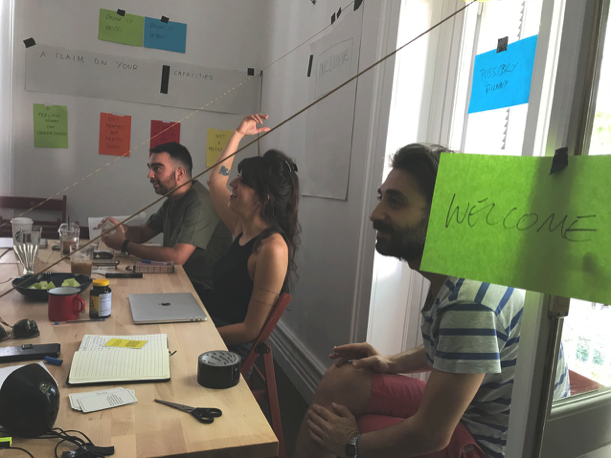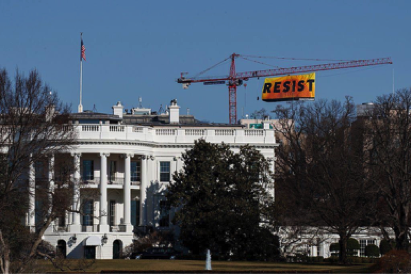
THE
THING
an auto- matic
work-
shop
in everyday
disruption
by Ant Hampton and
Christophe Meierhans
A workshop for the reflexively impotent
- Alexander Roberts , Iceland Academy of the Arts
Leftist thinker and activist Mark Fisher once coined the term ‘reflexive impotence’. It refers to a condition of inaction whereby people know very well that something is terrible, but have no belief that they themselves can change it, so they do nothing. Ant and Christophe’s workshop is an antidote.
As a dramaturg, curator and programme director for a Master programme – I am very busy with how we can support artists and audiences to make moves beyond rhetorical and critical acts in art towards acts of resistance and transformation. Ant and Christophe have developed a dramaturgical model for activism, which they introduce through this workshop, that supports that move.
With artistic and activist strategies as a blurry intersection upon which the workshop is built, Ant and Christophe provide a framework within which participants can question what capacities they have available to them for leaping beyond their apathy. The workshop enables participants to shift from the role of observer and critic of the realities they are entangled in, to intervenor and transformer of those realities. Furthermore – the workshop provides a mode of dramaturgical reflection that supports participants to maximise the impact of their activism. This is not an imaginary outcome either. The model can be used to dramaturge social and political activist strategies that will take place out there for real.

The Greenpeace action captured in this image captures the spirit their workshop calls for.
It is also very significant that there is no charismatic workshop leader standing before everyone. Like a somewhat less instructive Anarchist Cookbook, or less prescriptive Coming Insurrection, this workshop calls participants into action in solidarity with an anonymous many – not to the song of a singular awe-inspiring instructor.
In another sense, the Automatic Workshop is a factory of hope in a certain way. The kind of hope that Rebecca Solnit speaks of where hope is not “the belief that everything was, is, or will be fine”, because it’s clear that there is much to be troubled by in the world today – terrible suffering and destruction. Rather, for Solnit…
"Hope locates itself in the premises that we don’t know what will happen and that in the spaciousness of uncertainty is room to act. When you recognize uncertainty, you recognize that you may be able to influence the outcomes—you alone or you in concert with a few dozen or several million others. Optimists think it will all be fine without our involvement; pessimists take the opposite position; both excuse themselves from acting. Hope is an embrace of the unknown and the unknowable, an alternative to the certainty of both optimists and pessimists. It’s the belief that what we do matters even though how and when it may matter, who and what it may impact, are not things you can know beforehand. You may not, in fact, know them afterward either, but they matter all the same, and history is full of people whose influence was most powerful after they were gone."
Ant and Christophe’s workshop builds itself out of the legacy of these people, the hopefuls, who had no idea if they would have an impact or not, but did it anyway. The workshop draws upon these Solnit-esque hopefuls and call upon workshop participants to become the same. Quit with the optimism, quit with the cynicism, and get busy with resisting and transforming the troubling social, political, ethical and ecological realities we are entangled with. They call the optimists and the cynics into the trouble, and provide them with a model for thinking that assists them in maximising their newly developed activist endeavours. What could be more urgent right now, than a factory producing Solnit-esque activist hopefuls?